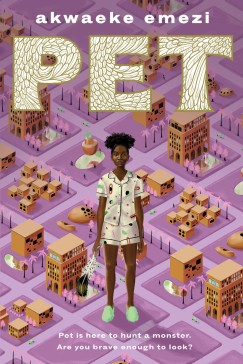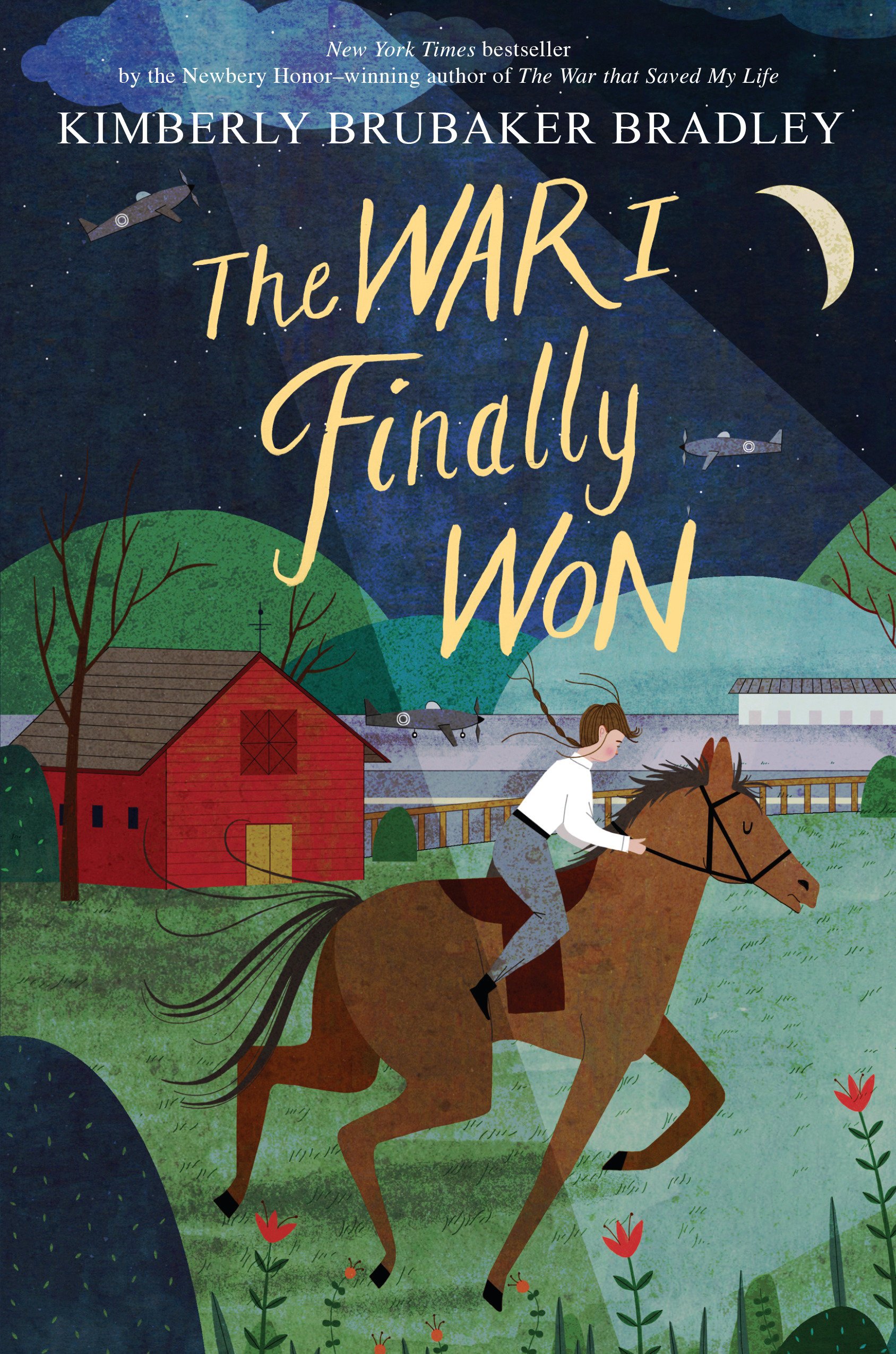I’M ALIVE, SUCKERS!!

Surgery went really well, and I’ve started the long process of learning how to (sort of) hear out of two ears again. I’ve got a cool-looking scar, a new cochlear implant, and three fantastic books to review, so let’s get to it! First, the futuristic Pet by Akwaeke Emezi.

Look, I don’t often recommend hyped-up YA books, but this one is well worth your time. Pet follows Jam, a girl who lives in the city of Lucille. She and her best friend, Redemption, have been taught that the monsters who used to roam the streets and halls of power have all gone. But Jam starts to suspect that this may not be true when she meets Pet, a creature who says it’s here to hunt a monster. Even worse, Pet says that the monster lives in Redemption’s house–one of the safest places Jam has ever known. As she starts to unravel a sinister mystery, Jam must learn how to hunt a monster when everyone keeps denying they exist.
I’ll start by saying that the audience for this book is probably on the younger side–maybe middle school? But I still loved it as a high schooler, and I think adults would probably like it, too. For one, I was refreshed by the fact that Lucille is an actual utopia. Pet isn’t one of those YA novels where a dystopia masquerades as a utopia and the protagonist has to take it down. Lucille’s government and representatives genuinely want the best for their citizens, and they’ve built a city that serves that purpose.
The world-building was wonderful–Lucille feels lived-in and warm. Parents bicker jokingly, little siblings are annoying, the library is still a safe haven for determined kids solving a mystery. Emezi makes the point that a utopia might look more familiar than we think–and, by extension, that it’s more attainable than we think. It references a lot of things that readers are probably already familiar with, like prison abolition, rehabilitation instead of jail time, and protests as a force for change. (And if younger readers aren’t already familiar with these things, Pet provides a fantastic starting point to learn about them.)
Most importantly, though, Emezi warns us that the work of actually sustaining a utopia is never done. Transparency, empathy, and a willingness to listen to the most vulnerable members of society are values that even a utopia like Lucille must re-commit itself to every day.
Also, Jam is selectively mute and uses sign language! So this deaf girl was definitely geeking out the whole time. Honestly, I could’ve read a whole book just about Lucille’s sign language–is it ASL? BASL? Does it incorporate signs from other sign languages, the same way Jam’s parents frequently use Igbo in their conversations? I was literally searching through the pages to see if I could find any more clues about it. The way Emezi showed how Jam’s parents and friends respect her communication preferences was subtle but moving, too.
I loved the relationship between Jam and Redemption as well–there’s something wonderful about a really well-written friendship that doesn’t turn romantic. The range of sexuality and gender in the book also stood out. Jam is trans, but it’s not a huge plot point. Redemption has three parents. It was also something of a relief not having to worry if a trans or disabled character was going to die, because Pet isn’t the type of book to treat its characters so callously.
In conclusion, read Pet! Not only is it a story that shows readers what an attainable utopia might look like, it’s also funny, heartfelt, and overflowing with love for its characters. (You should also read this really great interview that Emezi did with Teen Vogue!)
Next, let’s backtrack to the present(ish) day and discuss Women Talking by Miriam Toews.

In Women Talking, eight Mennonite women convene in a hayloft to debate whether or not they should leave the colony of Molotschna. For the past few years, they and their children have been repeatedly assaulted by a group of men, who are now in jail in the city. When the men of the colony leave to bail them out, the women and children are left alone–and face an impossible choice.
I don’t quite know how to feel about this book–it’s strong in a lot of ways and weaker in others. I’d say the biggest weakness is probably the narration. The story is told in the minutes of the meeting, which are taken by August Epp, a schoolteacher in the colony. He’s a fine narrator during the meetings–not so much when he’s talking about himself. The book gets off to a stumbling start when, within the first few pages, Toews throws a bunch of information about August’s backstory at us, which, to be frank, isn’t really that interesting, especially when the specter of a much larger predicament looms over the story. Even when the meetings actually start and August is taking notes, the book is continually bogged down with references to his life before re-joining the colony that feel excessive. I know that Toews is trying to endear him to the reader–he is the narrator, after all–but I’m pretty certain that there’s a more graceful way to do it.
A lot of the dialogue rings false, too. When Agata, one of the matriarchs, says, “This is a democracy, after all,” a teenage girl replies, “A what?” Ona and August reference poets and art and it’s revealed that August’s mother ran a secret school for girls. Many moments feel shoehorned.
It is caustically funny, though, one of the book’s major strengths. One of my favorite moments is when the women are discussing the certainties and uncertainties of leaving the colony:
Mejal defends Ona. Why couldn’t that be the case, that the only certainty is the power of love? she wonders.
Because it’s meaningless! Salome shouts. Particularly in this fucking context!
The story kind of reads as a Socratic seminar, with the women addressing philosophical and religious dilemmas with a slightly unbelievable amount of careful attention, given that they only have two days to make a decision. It’s a meditation on storytelling, patriarchal violence, and autonomy, and is trying very hard to be smart in the process. It would be smarter if it weren’t trying so hard.
Finally, let’s travel back in time to World War II with The War I Finally Won by Kimberly Brubaker Bradley.

In lieu of an actual review, please accept these screenshots of my grandma and I texting each other about it:

Well, ignore that last part about the AP. But yeah! To say that my grandma loves Little Women with a passion is the understatement of the century, so comparing The War I Finally Won to it is a pretty big deal!

I remember the conversation I had with my dad while I was crying! It went something like this:
“I didn’t expect it to be quite this emotionally devastating!”
“So it was really sad?”
“No!”
“Okay. Just…emotionally devastating.”
“Yes!”
 !!!!!!!
!!!!!!!
Also, bonus: Here’s my grandma talking about The War That Saved My Life, the first book, in case you need some motivation to read it.
 I mean!!
I mean!!
Maybe someday I’ll have the emotional fortitude to write a full review, but today is not that day, friends. I did try to write a review in June, but it was just a bunch of scattered thoughts, including the very bitter, “It’s a reminder that someone else has already written the book you want to write.” I mean, I really was so devastated by it that I couldn’t even look at it for a while.
A recap: The last time we saw London evacuees Ada and Jamie Smith, they were being reunited with their caretaker Susan in the seaside village of Kent after a bomb destroyed the house they’d lived in. The War I Finally Won begins a week after the end of The War That Saved My Life, on the eve of Ada’s surgery to fix her clubfoot. Soon after, Ada’s cruel mother dies in a bombing, Susan becomes the siblings’ guardian, and they move into a cottage on the property of the stony-faced Lady Thorton. And then Lady Thorton moves in with them, and later Ruth, a sixteen-year-old Jewish girl from Germany. As they wait out the war together, the world around Ada keeps shifting and growing in this moving, heart-wrenching, and ultimately healing sequel.
Here’s a very brief summarization of some of my thoughts, because I’m not even kidding when I say that if I think about this book for too long I start crying:
- I’ll start with this: There’s this line in an Atlantic article about The Fault In Our Stars that has stuck with me since I read it. It’s, “This is a book that breaks your heart—not by wearing it down, but by making it bigger and bigger until it bursts.” Granted, I don’t feel that way about The Fault In Our Stars. But I do feel that way about The War I Finally Won.
- The character development feels very, very earned. Ada’s trauma doesn’t just go away now that time has passed, but it’s obvious that she’s improved and trusts Susan more. (The relationship between Ada and Susan continues to bring me to tears, btw.) It helps that this book spans a lot longer than The War That Saved My Life. It begins when Ada is eleven and ends when she’s fourteen. (Do NOT even talk to me about how Ada would be in her nineties today or I will burst into tears.) And yet, the book never drags, either, for all the years that pass.
- I’d recommend reading Bradley’s post about writing a character with PTSD while simultaneously having PTSD herself. You should also read “A Touch on Lesbianism,” a funny and incisive blog post about Susan.
- The War I Finally Won is funnier than the first book, which I wasn’t expecting, but the humor feels very natural. Jamie is an excellent foil for Ada, just as before. When Jamie makes his cat a mourning armband, who quickly chews it up, Ada says, “Cats don’t mourn.” “They feel very sad,” Jamie retorts. “They just don’t like armbands.”
- Horses continue to be the best (what else is new?).
- It’s what I call a comfort food book, taking place almost entirely within the confines of the cottage and the surrounding property. It reminded me a lot of the first few pages of A Wrinkle In Time, when Meg, Mrs. Murray, and Charles Wallace are all in the kitchen during the storm. (It should come as no surprise to y’all that that scene was always my favorite.)
- There’s a lot of other stuff I want to say about it, but you should really just read it.
The War I Finally Won is almost unbearably intimate, so full of tenderness and communal care for each other that I was undone when I read the last page. And while the shadow of war and death looms over the story, it’s also filled with bursts of gentleness and love so overwhelming that I had to stop and take a breath just now thinking about it.
“The only way out of this is straight through,” Susan says to Ada while she’s recovering from surgery. “Courage.”
“Is that the same as being grateful?” Ada asks.
“Sometimes,” Susan replies.
Whatever. WHATEVER!! I’m not crying! Anyway, excuse me while I go get some tissues for a completely unrelated reason.
So glad the surgery went well, and welcome back! I love this post! The only book I’ve read out of the three was Pet (read in…April? I think? Sometime at the beginning of quarantine), and I thought it was fascinating. I keep meaning to draw Pet, but I’ve neglected for a few months, so…[ahem]
And I think you’ve convinced me to read The War that Saved My Life!
LikeLike
Okay as soon as you’ve finished reading TWTSML, text me or something because I NEED to talk about it with you!! I was having such a hard time visualizing Pet…if you ever do draw it, let me know! I’d love to see!
LikeLiked by 1 person
YES! I’ll try and review it once I read it. It’s available on my kindle library, so…😳 [insert “Perhaps” cow here]
I want to do a post about my bookish fanart soonish. I used to post a lot of it here, but I haven’t posted it on my blog in a few years, so I definitely want to try.
LikeLiked by 1 person